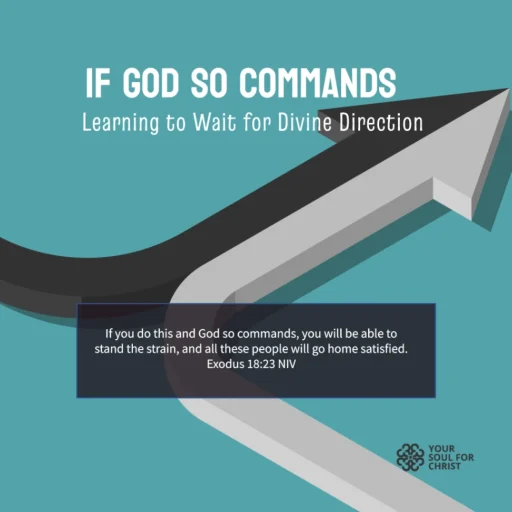If you do this and God so commands, you will be able to stand the strain, and all these people will go home satisfied.
Exodus 18:23 NIV
In Exodus 18, we encounter a remarkable moment of wisdom and spiritual clarity. Moses, burdened with the overwhelming task of judging the concerns of the Israelites alone, receives timely counsel from his father-in-law, Jethro. Jethro advises Moses to appoint capable men as leaders over the people to share the load. This plan seems both practical and strategic. Yet it is Jethro’s concluding words in verse 23 that strike a deeper chord: “If you do this and God so commands…”
This short phrase carries a powerful reminder that echoes far beyond the context of Moses’ leadership. While the advice Jethro gave was wise, sensible, and even effective by human standards, he made it clear that its implementation must depend on one thing: God’s command.
This struck me deeply as I meditated on the passage. It is not enough to have a plan that seems logical or successful by worldly wisdom. Even when a suggestion appears good and has the potential to solve problems, we are not to act on it unless God affirms it. Human reasoning, no matter how sound, can never replace divine instruction.
Jethro’s counsel reveals a critical truth for every believer. It is not about what appears right, but about what is right in the eyes of God. Our walk with the Lord must be rooted in obedience, not assumption. It is dangerously easy to conclude that a “good” idea must automatically align with God’s will—but that is not always the case. We must pause and ask, “What does God say about this?”
The words “If God so commands” serve as a spiritual checkpoint. They challenge us to seek divine confirmation before moving forward. They caution us against leaning on human understanding or being led by emotion, urgency, or popular opinion. Even well-meaning intentions must be filtered through the question: Has God commanded this?
This truth is especially important for those seeking to fulfil God’s purpose in their lives. It’s not enough to simply act on our desires, even if those desires seem righteous. We must resist the temptation to assume that our intentions automatically reflect God’s instructions. What matters most is not that we want to do something good, but that we have heard clearly from God regarding what He requires of us.
In moments of decision, we must prioritise discernment over impulse. Before taking any step, we should sincerely ask, “Lord, what is Your will in this matter?” Only when we are sure that God commands it should we proceed. This posture of spiritual humility ensures we are walking in alignment with Him, not ahead of Him.
Ultimately, this passage reminded me that obedience is better than assumption. The clarity, peace, and protection that come from acting on God’s command cannot be matched by the best of human plans. My conclusion is simple yet weighty: I must move and act only on the basis of God’s instruction—not merely my intention.
Living It Out
As you go about your week, take time to reflect on the decisions before you. Are you acting out of impulse, logic, or the approval of others? Or have you paused to seek the Lord’s voice? Ask God to guide your heart and help you discern His will clearly.
Let this truth become your anchor: not every good idea is a God idea. Wait for His leading. Rest in His timing. Let “If God so commands” be your standard, not your afterthought. In every decision—big or small—make His instruction your foundation. That’s the surest way to walk in purpose and peace.

